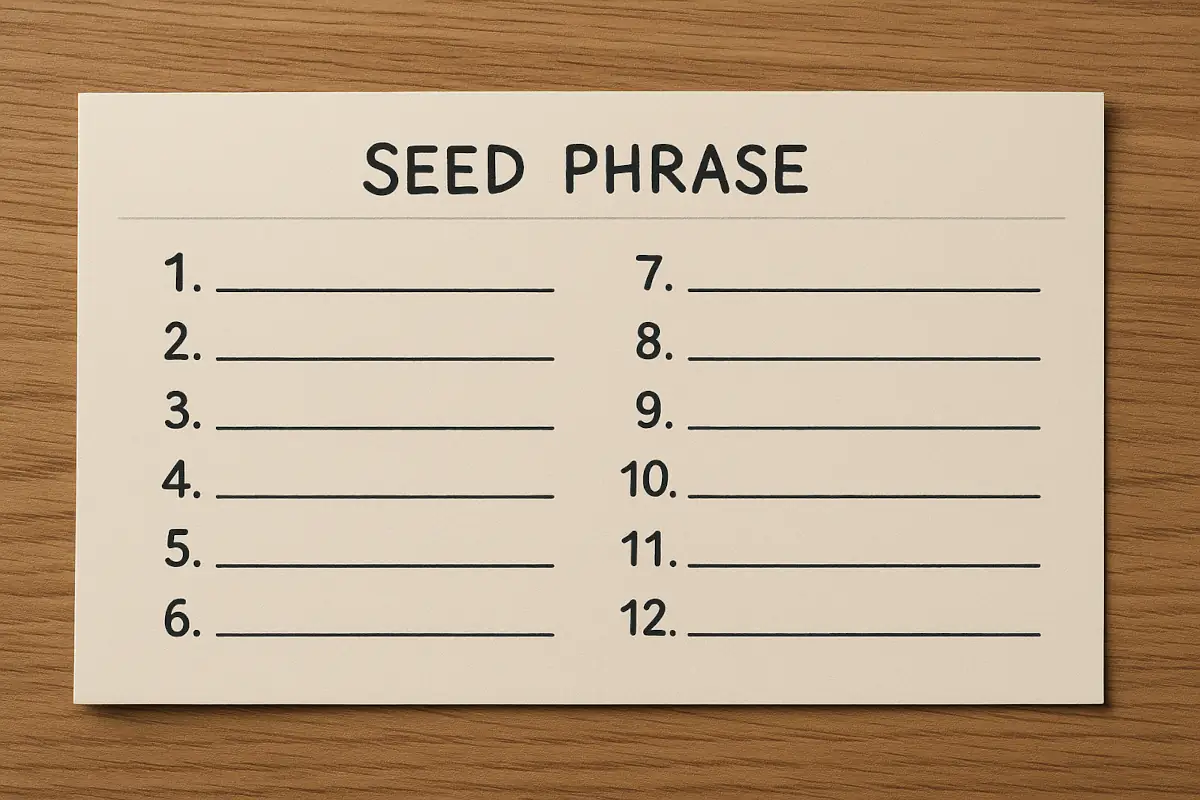When securing cryptocurrency, a seed phrase is central to protecting digital assets. Seed phrases, sets of randomly chosen words, function as recovery tools to access cryptocurrency wallets. Wallet users typically choose between 12-word or 24-word seed phrases. While both are highly secure, the complexity and practical usability vary significantly.
Table of Contents
Quick Comparison
| Feature | 12-word | 24-word |
|---|---|---|
| Entropy | 128 bits | 256 bits (but private key still has only 128 bits) |
| Security | Extremely strong | Extremely strong |
| Possible combinations if you don’t know order of words | 479001600 | 620448401733239439360000 (Not possible to guess by brute-force) |
| Memorization | Easier | More difficult |
12-Word Seed Phrases
Seed phrases consisting of 12 words generate about 128 bits of entropy. This offers approximately 3.4 x 10³⁸ possible combinations, providing considerable security. In practical terms, a 128-bit entropy level offers more than sufficient security for general cryptocurrency users. Experts believe that the 12-word seed phrase is strong enough to resist brute-force attacks.
The primary advantage of a 12-word seed phrase is simplicity. Shorter phrases are easier to remember and quicker to write down or recover. This convenience makes them popular among everyday cryptocurrency users, especially those managing moderate amounts. Cryptographer Adam Back has also supported the 12-word option, calling it secure enough for typical use.
However, the relatively shorter 12-word phrase has limitations, primarily when paired with weak security practices. Users who store these phrases digitally or use common passphrases expose themselves to higher risks. Despite their strength, carelessness can significantly increase vulnerability, potentially leading to compromised wallets.
24-Word Seed Phrase
In comparison, a 24-word seed phrase doubles the entropy, generating 256 bits. This heightened complexity yields about 1.15 x 10⁷⁷ possible combinations, a massive increase in security that makes any brute-force attempt practically impossible with existing technology. This added protection is recommended for substantial cryptocurrency holdings or long-term storage.
The significant advantage of a 24-word seed phrase extends beyond pure computational security. Even if someone has all the words of a 24-word phrase, rearranging them correctly to reconstruct the phrase is virtually impossible. This feature further reduces any chance of unauthorized recovery attempts, even when partial information is exposed.
However, managing a 24-word phrase is more difficult. It requires more meticulous handling and takes longer to record or restore due to its length. These practical considerations sometimes deter casual users who find the increased complexity unnecessary.
12 vs. 24 Words – Is More Security Actually Useful?
Both the 12-word and 24-word seed phrases are secure according to current cryptographic standards. While a 24-word phrase offers mathematically superior security, this extra security does not always translate into practical benefits.
Bitcoin, the most widely used cryptocurrency, has a security ceiling of approximately 128 bits, making 256-bit phrases somewhat redundant for everyday use. In other words – instead of trying to brute-force 24-word seed, it’s easier to just target the private key.
Furthermore, in actual scenarios, the likelihood of brute-force attacks succeeding even against 12-word phrases is negligible due to the vast combinations available. The primary concern for users remains securing their seed phrases from common risks, including human error, phishing, malware, and digital theft, rather than computational brute force.
Security experts emphasize that storing seed phrases offline significantly reduces vulnerabilities. Digital storage, screenshots, or cloud backups are discouraged. Instead, physical backups using durable materials, such as metal plates, are recommended to protect against disasters or damage, particularly for high-value storage.
Read also: What Are the Best Ways to Store Your Seed Phrases?
How BIP39 and BIP32 Changed Wallet Security?
Seed phrases follow the BIP39 standard, which allows mnemonic phrases to become universal recovery keys across wallets supporting this standard. BIP39 phrases, paired with BIP32, which provides hierarchical deterministic wallet functionality, significantly enhance organizational and security capabilities by allowing multiple wallet addresses to be derived from a single seed.
BIP32 introduces structured key generation at varying depths, including master keys and subsequent subkeys for managing numerous addresses. This hierarchical structure limits the exposure of the entire wallet if a single subkey becomes compromised, greatly enhancing overall wallet security and usability, particularly for managing multiple accounts or substantial crypto assets.
In practical terms, these standards ensure wallets remain versatile, organized, and secure, reducing complexity in managing multiple cryptocurrency accounts, and are particularly beneficial to businesses or advanced users with extensive portfolios.
Read also: How to Memorise a Crypto Seed Phrase? Smart Ways That Work
Expert Recommendations
According to Ledger and Trezor, leading hardware wallet manufacturers, using a 24-word seed phrase is recommended for users managing large cryptocurrency holdings or focusing on long-term storage. Both companies advocate the use of additional security measures, including passphrases, often termed a “25th word,” which must be precisely remembered.
Storing phrases offline is emphasized, avoiding digital risks entirely. Physical backup methods, such as engraved steel plates (like Cryptosteel or Billfodl), offer substantial durability against common hazards, ensuring long-term preservation of the recovery phrases. These best practice recommendations are widely endorsed across the cryptocurrency community.




